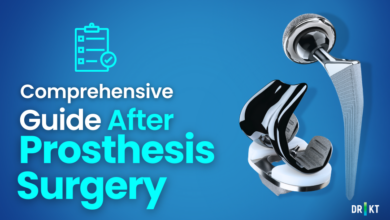
Knee replacement or hip replacement surgery can be intimidating for many patients. Some may postpone the procedure due to fear, often leading them to endure severe pain. In many cases, these fears arise from a lack of accurate information or from misleading details.
Gathering the right information and making necessary preparations are strategic steps in overcoming these concerns. Being well-informed about the surgery and following proper guidelines can help build your confidence.
It is important to prepare emotionally, mentally, and physically before the operation. Proper preparation not only increases the success rate of your operation but also makes your postoperative recovery smoother. Read the rest of our article to learn what you should pay attention to before undergoing joint replacement surgery.
Contents:
- What You Need to Know Before Surgery
- Preoperative Health Check
- Controlling Medical Conditions
- Preoperative Medication and Supplement Use
- Home Preparations
- Final Preparations the Day Before the Surgery
What You Need to Know Before Surgery
Preparing for joint replacement surgery starts with being well-informed about the entire process. Understanding the procedure, from preoperative preparations to postoperative recovery, helps you feel confident and secure about your decision.
Before your hip replacement and knee replacement surgery, take the time to gather detailed information. Speak with your doctor about any concerns or questions you have, and consult reliable sources to ensure you have the most accurate knowledge available. This approach will help you understand what to expect and how to prepare effectively.
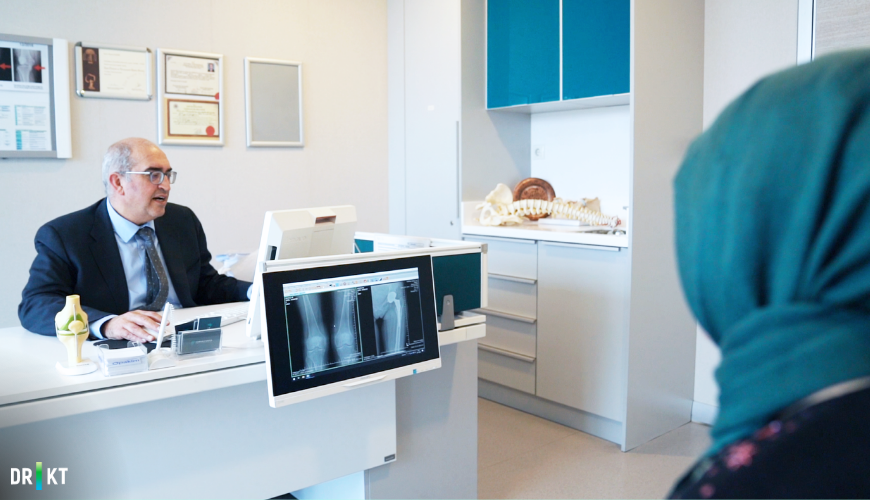
Here are some questions to ask before hip replacement surgery and knee replacement surgery:
- What are the short-term and long-term risks if I delay or skip the surgery?
- What is the success rate of the procedure?
- What potential complications should I be aware of after the surgery?
- Which surgical approach will be used, and how does it affect the outcome?
- How long does knee replacement surgery take? /How long does hip replacement surgery take?
- How long is the typical hospital stay after the procedure?
- What factors should I consider after receiving the implant?
- Which symptoms should I monitor during my recovery?
- Who should I contact if I experience any issues post-surgery?
Above are the questions that patients are most curious about before knee and hip replacement. However, the questions may vary from person to person. In addition, the answers to some questions may differ depending on the state of health. Therefore, you should not hesitate to contact your doctor for the most accurate answers specific to your situation.
Preoperative Health Check
Both knee replacement and hip replacement surgery are elective procedures. This means they do not require urgency and can be planned several weeks or even months in advance. This allows you to prepare and ensure you are in the best possible health before the operation.
If you have a chronic condition like diabetes, high blood pressure, or hypothyroidism, your treatment can be adjusted. This preparation reduces the risk of complications after knee replacement or hip replacement surgery. Being physically ready increases your chances of a successful outcome.
Preoperative Medical Evaluation
Many factors are evaluated when deciding whether a joint replacement surgery is suitable for you. In the 30 days leading up to the operation, your doctor will perform several tests to ensure you are ready. What tests are done before knee replacement surgery or hip replacement surgery? The following evaluations are typically conducted:
- Medical history review
- Physical examination
- Blood tests
- Electrocardiogram (ECG)
- Echocardiogram (echo)
- Cardiac scintigraphy (myocardial scintigraphy)
- X-rays and other imaging studies
- Urine sample
The results, checked by the doctor, show whether your body is ready for surgery and whether there are any conditions that need attention.
Additionally, be sure to discuss important details with your doctor, such as:
- Previous medical advice and treatments
- Dietary restrictions or allergies
- Chronic diseases and previous illnesses
- Current medications and supplements
- The doctors and health professionals you see
- Previous surgeries and treatments (e.g. cancer treatment)
- Smoking and alcohol habits
It is very important that you discuss all aspects of your health with your doctor. Thus, necessary measures can be taken in time and many risks can be avoided. It also makes it easier to manage your surgery and knee replacement surgery recovery or hip replacement surgery recovery process.
Controlling Medical Conditions
Some patients may have more than one condition at the same time. Some of these conditions can be chronic and need to be kept under control. Especially if you need joint replacement surgery, you should approach the following diseases with caution.
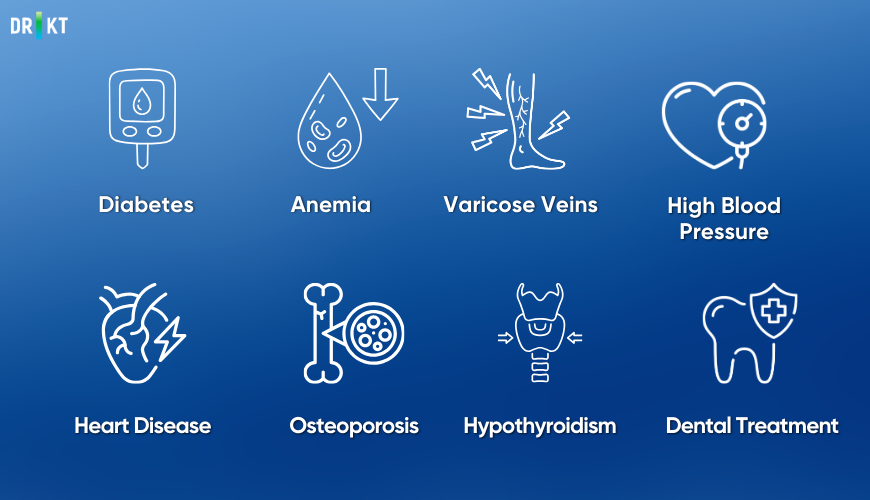
Picture 2. Certain conditions must be controlled before undergoing knee replacement surgery or hip replacement surgery to ensure the best possible outcomes.
Diabetes
If you have diabetes, you should talk to your doctor about the best way to control your blood sugar before surgery. Uncontrolled diabetes can slow the healing of your surgical wound. It can also pose a high risk of infection, kidney and heart problems.
Anemia
Anemia can increase the risk of heart and wound complications during surgery. Therefore, your red blood cell count should be checked before surgery. If the count is low, your doctor will guide you to increase your red blood cell levels before surgery. In addition, you should discuss with your doctor plans for managing anemia after knee replacement surgery or hip replacement surgery.
Varicose Veins, Leg Swelling and Blood Clots
Surgery and post-operative immobility increase the risk of blood clots forming in your legs. Blood clots can cause pain and leg swelling after knee replacement surgery and hip replacement surgery. It can even spread to other parts of your body, especially your lungs.
If you or your family members suffer from blood clots, varicose veins or leg swelling, you should inform your surgeon. In some surgeries, blood thinners or compression devices for your legs may be used to help prevent blood clots.
High Blood Pressure (Hypertension)
If you have high blood pressure, you should talk to your surgeon and primary care physician about your medications. You should have your blood pressure checked several times in the days before your surgery. Your blood pressure must be kept under control with medication until the day of joint replacement surgery. If it cannot be controlled, your surgery may be postponed.
Heart Diseases
Heart disease must be under control before joint replacement surgery. Your surgeon may refer you for a stress test, heart ultrasound (echocardiography) and heart scintigraphy to assess whether there is a risk to your heart health. In particular, people with coronary artery disease or arrhythmias, who have had a heart attack or are at high risk of having a heart attack should have these tests.
If you are at risk, your joint replacement surgery can be postponed and you can start treatment for your heart condition first.
Osteoporosis (Bone Resorption)
Hip and knee replacement surgery with osteoporosis is an important issue. Your surgeon will order a bone density test to diagnose whether you have osteoporosis. If there is mild osteoporosis, joint replacement surgery can usually be performed. However, in severe osteoporosis, the bones may not support the prosthesis. In these cases, osteoporosis should be treated first and joint replacement surgery should be postponed.
Hypothyroidism
Hypothyroidism can slow the healing process after joint replacement surgery and increase the risk of complications. However, this does not prevent surgery. You should consult your doctor to keep hypothyroidism under control. You can have joint replacement surgery by adjusting the dosage of medication, checking your hormone levels more frequently and taking additional precautions to reduce the risk of infection.
Dental Treatment
If you have dental problems;
- Complete all necessary dental procedures at least six weeks before the joint replacement surgery.
- Avoid any dental procedures for three months after the operation.
Dental procedures like tooth extractions or gum treatments can allow bacteria into your bloodstream. This may lead to an infection in your joint prosthesis. If you recently had or will have a dental examination, inform your doctor. They can prescribe antibiotics for dental work after knee replacement surgery.
Preoperative Medication and Supplement Use

In the period before knee replacement surgery or hip replacement surgery, you should share all medications and supplements you are taking with your doctor. Some medicines may need dose adjustment or may need to be stopped for a while. Below is some information about the use of medicines and supplements before surgery that your doctor may recommend:
- Nonsteroidal Anti-inflammatory Drugs (NSAIDs): You should stop taking medicines (NSAIDs) such as Naproxen, Ibuprofen and Aspirin before surgery. This is because these medicines can increase the loss of blood during surgery by preventing blood clotting.
- Supplements: If you are taking supplements, you may need to stop many of them before surgery. These include vitamin E, ginkgo biloba, ginseng, glucosamine and fish oil. These supplements may increase the risk of bleeding.
- Blood Thinners: Blood thinners also increase the risk of bleeding, so you may need to stop taking them.
- Other Medications: Some types of antidepressants and monoamine oxidase inhibitors (MAOIs) interfere with anesthesia before surgery. So it may be necessary to discontinue their use.
- Rheumatism Medications: Medications for rheumatism can affect the immune system or complicate the healing process. It is important to review these with your doctor to ensure they do not negatively impact the surgery or recovery.
Weight Control
Maintaining an ideal weight for knee replacement surgery and hip replacement surgery is important for those with joint disorders. Excess weight places significant strain on joints, worsening pain and accelerating cartilage wear. This stress not only complicates daily movement but also raises risks during and after surgery, such as infections, blood clots, or prolonged recovery times. By reaching a healthier weight before surgery, patients can reduce these risks and improve their long-term outcomes

Weight loss relieves pressure on weight-bearing joints, which is particularly important for preserving artificial implants. For example, losing just 4 kilograms (9 pounds) can reduce the load on your knee by approximately 18 kilograms (40 pounds) during activities like walking. This reduction in strain supports faster healing, eases rehabilitation efforts, and may extend the lifespan of the replacement joint.
You can start exercising and reorganize your diet to control your weight. Always consult your surgeon or a nutritionist to create a plan tailored to your needs, ensuring your approach is safe and effective.
Exercises
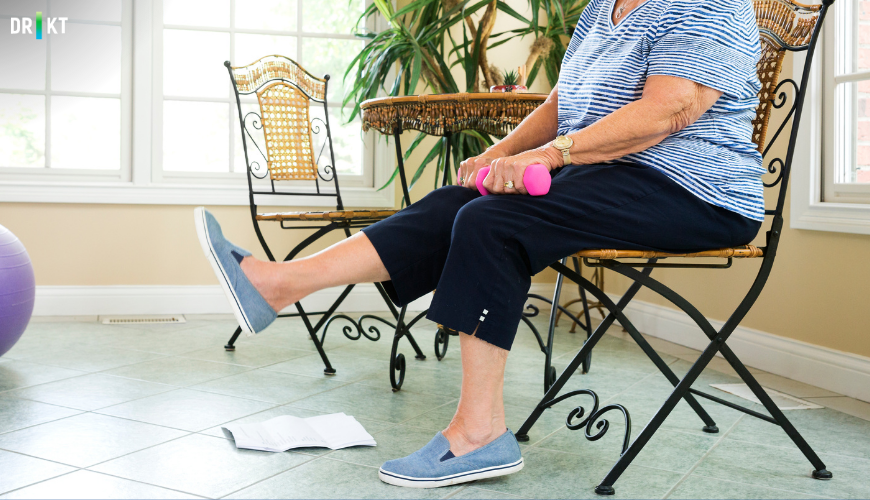
Preparing your body through targeted exercises before knee replacement surgery and hip replacement surgery is a key step in ensuring a smoother recovery. Limited mobility due to joint pain can lead to muscle weakness, making daily movements challenging. While surgery will address the joint itself, strengthening your muscles beforehand helps support the new joint and improves postoperative outcomes.
Pre-knee replacement surgery exercises and pre-hip replacement surgery exercises have many benefits for your recovery:
- Improved Strength and Flexibility: Strengthening muscles around the affected joint enhances stability and endurance. This prepares you to perform postoperative rehabilitation exercises with greater ease.
- Familiarity with Movements: Learning proper exercise techniques before surgery reduces the learning curve during recovery. While your postoperative routine may change, learning basics like leg lifts or gentle stretches early can boost confidence.
- Upper Body Preparation: Building upper body strength (e.g., through seated rows or light resistance training) helps you safely use crutches or walkers after surgery.
- Weight Management Support: Exercises before surgery can help you lose weight. This can reduce the pressure on your knee or hip joint. This can help to reduce your pain and help you move more easily.
If pain limits your ability to exercise, consult your doctor or physical therapist. They can recommend low-impact alternatives, such as water-based exercises or seated movements, to protect your joints while maintaining activity.
Diet

The other way to control weight before joint replacement is to adjust your diet. For this, you can first consult your doctor and dietitian. They will guide you to the most suitable diet for you.
Focus on these principles to create a sustainable, health-supporting diet:
- Prioritize Whole Foods: Combine vegetables, fruits, lean proteins (e.g., chicken, fish, beans), and whole grains. These foods provide vitamins, minerals, and fiber without excess calories.
- Stay Hydrated: Drink plenty of water daily to support metabolism, joint lubrication, and overall health.
- Control Portions: Use smaller plates, avoid second servings, and pause between bites to prevent overeating.
- Limit Processed Foods: Reduce intake of sugary snacks, fried foods, and high-sodium meals, which contribute to inflammation and weight gain.
If you have chronic conditions like diabetes or heart disease, your diet before knee replacement surgery or hip replacement surgery may need adjustments. For example, managing blood sugar levels or reducing cholesterol intake could become priorities. A dietitian can tailor your plan to address these needs while keeping your weight and joint health on track.
Smoking and Alcohol Use
Preparing for joint replacement surgery involves more than physical readiness—it requires addressing habits that can risk your recovery. Both smoking and excessive alcohol consumption have well-documented risks, particularly in orthopedic procedures like hip or knee replacement surgery.
Smoking is a leading cause of preventable health issues, including complications in joint replacement surgery. Nicotine restricts blood flow and oxygen delivery, which slows bone repair and weakens tissues. This can lead to:
- Delayed wound healing.
- Higher infection rates.
- Increased scar tissue formation.
- Respiratory issues during anesthesia.
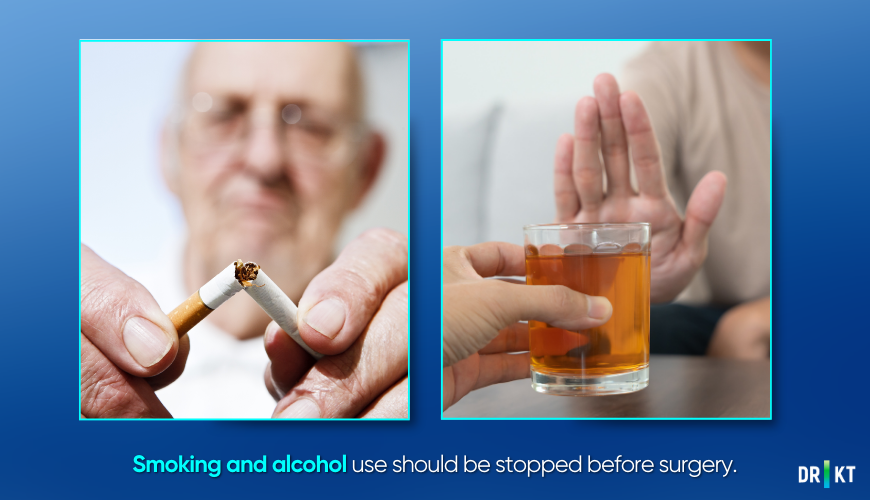
Heavy alcohol consumption before surgery—whether alcohol before hip replacement surgery or knee replacement surgery—can disrupt healing and increase complications. Studies link preoperative alcohol abuse to:
- Prolonged hospitalization.
- Higher infection risks.
- Increased need for blood transfusions.
After surgery, drinking alcohol after hip replacement surgery or knee replacement surgery should be avoided. Alcohol can interfere with pain medications, weaken bones, and delay tissue repair.
Patients who avoid smoking and joint replacement surgery risks, along with moderating alcohol use, often experience faster recovery and better long-term outcomes.
Home Preparations
It will take a certain amount of time to recover from joint replacement surgery. It is therefore very important that your home is safe and comfortable during the recovery process. Whether you’re learning how to prepare your home for hip replacement surgery or knee replacement surgery, thoughtful adjustments can reduce fall risks, ease daily tasks, and support your healing process

Here’s what you can do to make your home more comfortable and safe:
- Remove Items You May Trip Over to Prevent Falls: Temporarily remove all carpets, rugs, electrical cables and other items that you might trip over. Rearrange your furniture so that you can walk around the house comfortably. If you have a cat or dog at home, it may be appropriate for a friend or family member to keep it temporarily. This is because there is a risk of tripping over your cat or dog.
- Create Large Areas You Can Walk: You may need to use a walker or crutches for a while after surgery. When using this equipment inside the home, be careful to create large spaces. It is important that you walk regularly when you return home after the operation. For this purpose, you can create a “walking track” in your home without any furniture. Your goal should be to walk at least six times a day for five minutes each time.
- Keep the Things You Need Close by: After surgery, you may have difficulty bending or reaching. To bend or reach as little as possible, you can keep frequently used items close by. You may also find it easier to use a holding device.
- Use Grab Bars in Your Bathroom: The bathroom can be a risky place for falls. You can make your bathroom safer by placing grab bars in appropriate places.
- Get Bathroom Items That Make Your Work Easier: Get items that make bathing safe and comfortable, such as a long-handled sponge/brush, bath chair, bathtub seat, etc.
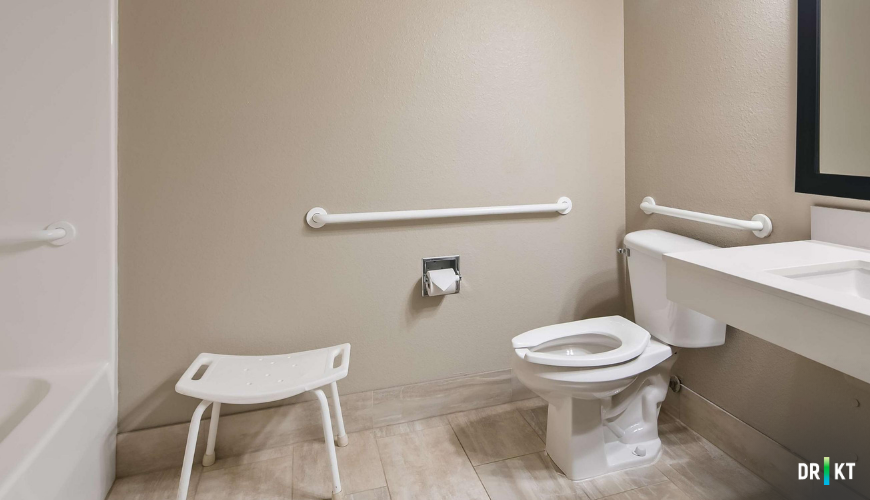
- Limit Your Living Space: If you live in a two-story house, going up and down the stairs can be challenging. Also, moving back and forth between rooms can cause fatigue. So, especially for the first few weeks, you can limit the space you spend time in to one room.
- Keep a Night Light Next to Your Bed: You should have a lamp next to your bed and keep it on throughout the night. Because when you wake up at night and need to go to the toilet, you may not be able to see in the dark and fall.
- Arrange Assistive Equipment: After surgery, there is equipment to help you with certain activities such as walking, dressing and using the toilet. This equipment helps to keep you safe while you are recovering. Examples include crutches, walkers, sock-wearing aids, toilet risers and bathtub seats.
- Use a Carrying Bag for Your Walker: You can attach a carrying bag to your walker so that there is no risk of falling when you need to carry items.
- Plan Your Rest Areas: Use chairs with arm rests. If your chair has wheels, make sure that the wheels are lockable.
- Sit Relaxed and Comfortable: You can use pillows or cushions to provide extra support and comfort when sitting on the sofa.
- Find People to Help You: When you arrive home after surgery, you will need someone to help you. We recommend having a family member or friend with you at all times, especially during the first week.
- Plan Your Favorite Activities: You will spend a lot of time at home during your recovery. So make plans for your favorite activities. For example; books, films, knitting, board games, etc.
If You Will Be On Your Own During the Recovery Process
While having support is ideal, proper preparation can help you manage effectively if you’ll be home alone after knee replacement surgery or hip replacement surgery. When you leave the hospital after the operation, some arrangements you have made beforehand at home will help you in your recovery process.
- Arrange Transportation: Coordinate rides in advance for your trip home from the hospital and follow-up appointments.
- Stock Up on Supplies: Before surgery, purchase non-perishable groceries, medications, and household essentials. Prepare and freeze easy-to-reheat meals to minimize cooking efforts during recovery.
- Simplify Meal Preparation: Use disposable plates and utensils to reduce dishwashing. Keep snacks, water, and frequently used items on countertops or tables to avoid bending or reaching.
- Prioritize Safety: Keep a phone or emergency alert device charged and within reach at all times.
- Schedule Regular Check-Ins: Ask a friend, neighbor, or family member to call or visit daily. Share your recovery timeline so they know when you might need extra help.
Final Preparations the Day Before the Surgery
The night before knee replacement surgery or hip replacement surgery will be a busy time, filled with many preparations. Use this time to review instructions, organize essentials, and focus on rest. You should also pay attention to these factors before the operation:
- Do not consume food or liquids (including water) for at least 8 hours before surgery. This reduces anesthesia-related risks.
- Take prescribed high blood pressure medication with a small sip of water only. Avoid any other medication unless instructed.
- If you have a pacemaker, carry its identification card and inform your surgical team beforehand.
Preparing Your Skin for Surgery
Infections that occur after surgery are often caused by bacteria on the patient’s own skin. Reducing the amount of bacteria on the skin before surgery helps to reduce and prevent the risk of infection. Studies have shown that certain antibacterial products help remove bacteria from the skin and reduce the risk of infection at the surgical site.
Antibacterial Kit Provided Before Surgery
To reduce the risk of infection, you will be given an antibacterial hygiene kit before your surgery. Some products in this kit may contain an antibacterial agent called chlorhexidine gluconate (CHG). CHG helps cleanse the skin of bacteria and provides protection against infections on the day of surgery. Once applied, it reduces the amount of bacteria on the skin within a few hours.
If you have an allergy to chlorhexidine gluconate, be sure to inform your doctor.
Preoperative Skin Cleaning
The day before the operation, your surgical site should be cleaned with the antibacterial skin cleansing wipe provided to you. Follow the steps below:
- The day before surgery, wash your entire body with regular soap or shampoo. Rinse thoroughly to remove all residue.
- After showering, do not apply lotions, powders, oils, deodorants, perfumes, or any other cosmetic product. These products can interfere with antiseptic preparations.
- Gently clean the area where the surgery will occur using the antibacterial skin cleansing wipe provided by your healthcare team. Focus only on the joint being operated on (e.g., knee or hip). Avoid applying the wipe to your face, genitals, or other sensitive areas.
- Do not shave the surgical area 24 hours before the procedure. If hair removal is necessary, use an electric shaver to prevent nicks or cuts. Razors can damage the skin and increase infection risks.
- Any tear in your skin can allow bacteria to enter your body and cause an infection. Examine all skin folds and areas prone to irritation, such as the groin, underarms, behind the knees, and under the breasts. Report any cuts, rashes, or abnormalities to your surgeon immediately.
- Do not wear makeup, nail polish, or artificial nails. Remove all jewelry, including rings, necklaces, bracelets, and watches before going to the hospital.
Items You Should Have with You On the Day of Surgery
Prepare a bag to take to the hospital. The following items should be in the bag:
- Identity card: You must have your identity card or passport with you.
- Clothing: Pack comfortable and loose clothing. Clothes such as loose tracksuits, pajamas, t-shirts or bathrobes provide comfort both while spending time in your room and during physiotherapy sessions. Also, do not forget to take your underwear and spare clothes with you.
- Footwear: Bring comfortable slippers and bedroom slippers for use in the hospital, and rubber-soled, flat and comfortable trainers for use outside the hospital.
- Medications: Bring all prescribed medications in their original packaging.
- Medical Devices: Bring your medical devices such as glasses, lenses, hearing aids, dentures, etc. in their special containers. If you have dentures, they must be removed before the operation.
- Personal Belongings: It is recommended that you bring some personal items such as towel, fork, spoon, plate, glasses, etc. with you.
- Personal Care Products: You can obtain most personal care products from the hospital. However, if you wish, you can also bring your own personal care products such as nail clipper, patient diapers, hygienic pads, wet wipes.
- Assistive Walking Devices: You may need a walker or crutches after the operation. You will be given a walker while you are in the hospital, but it is recommended that you get a suitable assistive walking device on the way out.
- Optional: You can bring items that you can spend time with such as phone, tablet, laptop, e-book reader, charger, books, newspapers, magazines, headphones.
Conclusion
Preparing for joint replacement surgery is a stage that significantly impacts your recovery. By addressing physical, emotional, and mental readiness, you can reduce complications, ease anxiety, and set the stage for a smoother healing process.
The decision to undergo surgery can be overwhelming, but thorough preparation helps you feel more in control. This guide has outlined essential steps, from managing chronic conditions and medications to adjusting nutrition, exercise, and home safety. Each of these elements plays a role in ensuring you’re fully prepared for the procedure and the recovery that follows.
If you have additional questions or concerns about the preoperative process, you can contact us through our website or social media channels for further support.
Frequently Asked Questions
What are the types of anesthesia for knee replacement surgery or hip replacement surgery?
There are several types of anesthesia available for joint replacement surgeries. The common options include general anesthesia, regional anesthesia, local anesthesia, and sedation. Your doctor will carefully evaluate factors such as your age, weight, body mass index, chronic diseases, previous surgeries, medications, and allergies. They will also perform the necessary tests to determine the most suitable type of anesthesia for you.
What should I wear on the day of the operation?
You should opt for comfortable and loose-fitting clothes, such as tracksuits or pajamas, which make it easier for hospital staff to manage pre- and post-surgery care. It is necessary to avoid jewelry or any accessories that might interfere with the procedure. Also, choose non-slip and comfortable slippers to help prevent falls during your hospital stay.
